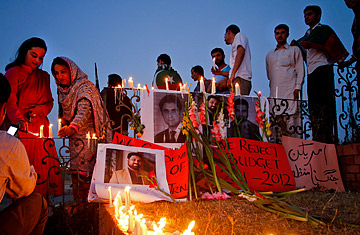
Supporters of Pakistan's Tehreek-e-Insaf (Movement of Justice) place candles next to portraits of slain journalist Syed Saleem Shahzad during a vigil in Islamabad, Pakistan, on Monday, June 6, 2011
Najam Sethi is no stranger to official harassment and death threats. Since the 1970s, the prominent Pakistani journalist has been charged with treason three times. He has been held incommunicado and even tortured. In recent years, his name has appeared on hit lists drawn up by those enraged by his outspoken opposition to religious militancy. For the past two years, Sethi and his family have been forced to live under police protection.
The hostile attention has not abandoned him. Since the May 1 U.S. raid that killed Osama bin Laden, Sethi and other leading Pakistani journalists have come under intense pressure from Inter-Services Intelligence (ISI), the country's most powerful intelligence agency. With top spies having made their fury plain in private, the journalists now face a public campaign of intimidation bent on silencing them and holding them up as traitors.
The latest troubles started, Sethi says, when he began to ask tough questions about the al-Qaeda leader's presence in Abbottabad, a garrison town a three hours' drive from the capital, Islamabad. On his television show and in his editorials, Sethi demanded to know why the military had failed to discover bin Laden's presence and whether it may have been hiding him. "My view was that they were either incompetent or complicit and had to answer the charges," he says.
Sethi's questions grew more pointed after the corpse of fellow journalist Saleem Shahzad was discovered on May 31, three days after Shahzad mysteriously disappeared. Suspicions immediately fell on the ISI. As first reported on TIME.com, Shahzad told human-rights campaigners that he had earlier been threatened by the ISI. "This isn't al-Qaeda's style," Sethi told his viewers, adding that terrorists are keen to publicize the killings they author.
According to the official autopsy, some 15 marks of torture were found on Shahzad's body, heightening the earlier suspicions. Torture, Sethi explained to his viewers, was an interrogation technique long favored by Pakistan's police and intelligence agencies. He elaborated by drawing on his own grim experiences: when Sethi was picked up in 1999 for having accused the sitting government of corruption, he was hooded and beaten.
During the ordeal, Sethi recalled, "I stopped breathing and thought I was going to die." He suffered a heart attack before his tormentors relented. Shahzad's case may have been similar, Sethi suggested to his viewers at the end of May, just hours after Shahzad's body was retrieved. The slain journalist's abductors may have wanted to only torture him, but in the process, they ended up taking his life before they realized they had gone too far.
The speculation struck a raw nerve at the ISI's headquarters in Islamabad. For decades, the ISI has evaded much public scrutiny. Human-rights groups accuse it of rigging elections, destabilizing governments, boosting jihadist proxies, kidnapping and carrying out extrajudicial executions. Discreetly, many Pakistanis make the same charges. But the murder of Shahzad marks a turning point: now the allegations are being made in the mainstream media, adding to a recent wave of unprecedented criticism of the military.
A striking example is a bluntly worded and widely read column by Ejaz Haider, a defense specialist who writes for several newspapers. "The ISI, the agency that you head, is being accused of Saleem's murder," Haider wrote in the op-ed that was cast as an open letter to ISI chief Lieut. General Ahmed Shuja Pasha. "You must know that the ISI is widely reviled and dreaded at home. For an agency that was set up primarily for strategic intelligence, this is quite an achievement."
